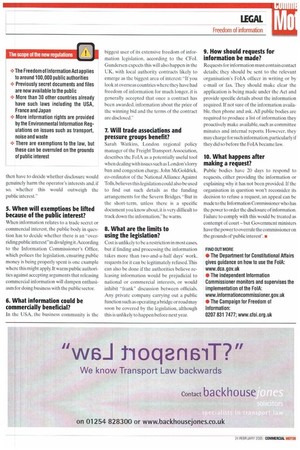Knowledge is Dower1..
Page 34

Page 35

If you've noticed an error in this article please click here to report it so we can fix it.
New legislation introduces the right to demand information from government departments.
How could this affect you? Guy Sheppard
focuses on the 10 things you need to know.
ew rights to see Government-held information could be a double-edged sword for operators, opening up previously secret details about the way public contracts are awarded, but also allowing sensitive questions to be asked about their own business. The legislation making this possible is the Freedom of Information Act and the Environmental Information Regulations.
I. Who is covered by the new law? The Freedom of Information Act (Fol A) came into force on 1 January, establishing the right to see a range of material held by around 100,000 public bodies ranging from Government departments to little-known quangos. The Vehicle and Operator Services Agency and the Traffic Area Offices are covered by these rules, which apply to England, Wales and Northern Ireland.A similar Act covers Scotland.
2. Why was the law passed?
The FoIA follows sustained pressure to make Government more accountable.The Campaign for Freedom of Information (CFoI), which was established 20 years ago,says it will help people discover whether they are exposed to hazards and give them a better chance of influencing decisions before they are taken. Secretary of State for Constitutional Affairs Lord Falconer says: -For too long, the UK has lagged behind many other countries which implemented Freedom of Information years ago."
3. What are the Environmental Information Regulations?
These regulations were introduced in response to the European Union directive and also came into force on 1 January. They have more teeth than the FoIA, giving public officials fewer reasons for withholding information. Because the regulations cover issues such as noise and air pollution, they could mean that more environmental information is made available about hauliers' operating centres. However, the Environmental Services Association does not expect them to have much impact on the waste sector, simply because most relevant information is already in the public domain.
4. Can commercially sensitive information be released?
Information held by the Vehicle and Operator Services Agency and the Traffic Area Offices is a particularly sensitive area for operators. Likely exemptions include personal informa tion, details of investigations, court records and commercially sensitive information. However, the CFoI says the public can still ask for commercial information. CFoI researcher Katherine Gundersen explains: 'They [the organisations holding the sensitive information] then have to decide whether disclosure would genuinely harm the operator's interests and, if so, whether this would outweigh the public interest."
5. When will exemptions be lifted because of the public interest?
When information relates to a trade secret or commercial interest, the public body in question has to decide whether there is an "overriding public interest" in divulging it. According to the Information Commissioner's Office. which polices the legislation, ensuring public money is being properly spent is one example where this might apply. It warns public authorities against accepting arguments that releasing commercial information will dampen enthusiasm for doing business with the public sector.
6. What information could be commercially beneficial?
In the USA, the business community is the biggest user of its extensive freedom of information legislation, according to the CFoI. Gundersen expects this will also happen in the UK. with local authority contracts likely to emerge as the biggest area of interest: "If you look at overseas countries where they have had freedom of information for much longer, it is generally accepted that once a contract has been awarded, information about the price of the winning bid and the terms of the contract are disclosed."
7. Will trade associations and pressure groups benefit?
Sarah Watkins, London regional policy manager of the Freight Transport Association, describes the FoIA as a potentially useful tool when dealing with issues such as London's lorry ban and congestion charge. John McGoldrick, co-ordinator of the National Alliance Against Tolls, believes this legislation could also be used to find out such details as the funding arrangements for the Severn Bridges. But in the short-term, unless there is a specific document you know about, it is very difficult to track down the information,he warns.
8. What are the limits to using the legislation?
Cost is unlikely lobe a restriction in most cases, but if finding and processing the information takes more than two-and-a-half days' work, requests for it can be legitimately refused.This can also be done if the authorities believe releasing information would be prejudicial to national or commercial interests, or would inhibit "frank" discussion between officials. Any private company carrying out a public function such as operating a bridge or road may soon be covered by the legislation, although this is unlikely to happen before next year.
9. How should requests for information be made?
Requests for information must contain contact details; they should be sent to the relevant organisation's FoIA officer in writing or by e-mail or fax. They should make clear the application is being made under the Act and provide specific details about the information required. If not sure of the information available, then phone and ask. All public bodies are required to produce a list of information they proactively make available, such as committee minutes and internal reports. However, they may charge for such information,particularly if they did so before the FoIA became law.
10. What happens after making a request?
Public bodies have 20 days to respond to requests, either providing the information or explaining why it has not been provided. If the organisation in question won't reconsider its decision to refuse a request, an appeal can be made to the Information Commissioner who has the power to order the disclosure of information. Failure to comply with this would be treated as contempt of court — but Government ministers have the power to overrule the commissioner on the grounds of 'public interest'..
FIND OUT MORE
• The Department for Constitutional Affairs gives guidance on how to use the FolA: www.dca.gov.uk • The independent information Commissioner monitors and supervises the implementation of the Folk www.intormationcom issioner.gov.uk • The Campaign for Freedom of Information: 0207 831 7477; www.cfoi.org.uk










































































































































































































